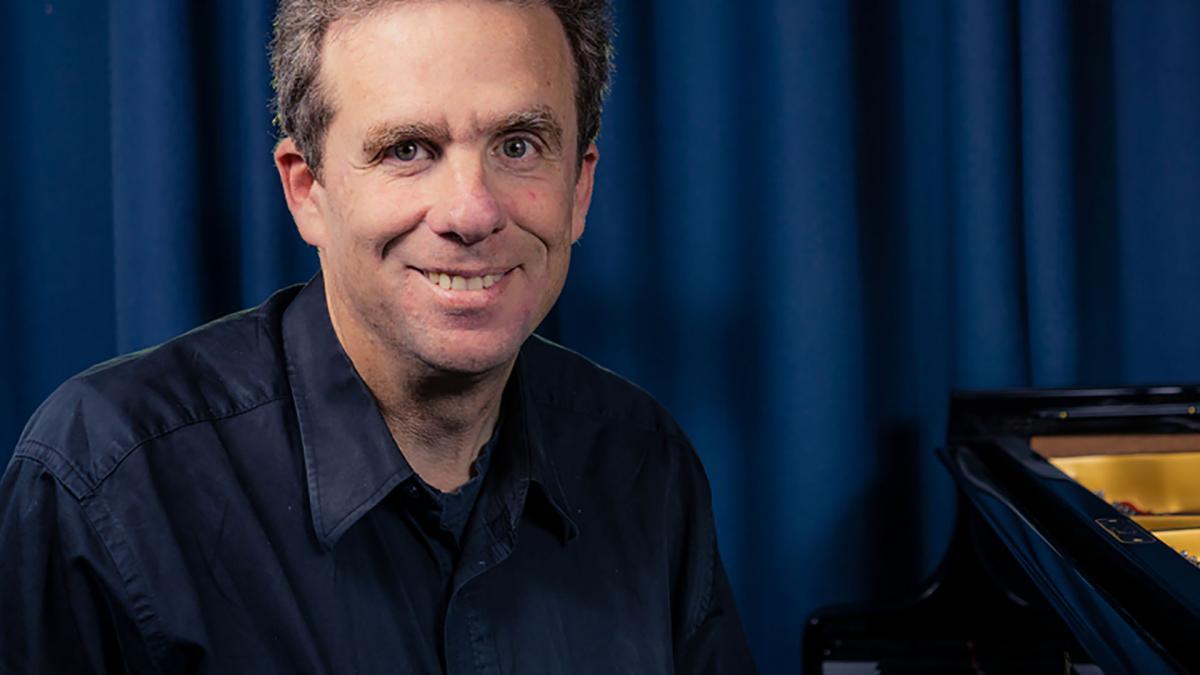Visiting professor David Dolan: Improvisational state of mind has an impact on performance experience and communication with the audience
Sibelius Academy visiting professor, the pianist David Dolan, is a world-class expert on classical improvisation and an active researcher on the impacts of Improvisational state of mind on musicians and the communication with their audiences.

Professor Dolan will be visiting the Sibelius Academy six times in 2023. In addition to workshops, masterclasses and a public concert in June 2023, he will be involved in large-scale research together with the Finnish neuroscientist Professor Mari Tervaniemi (University of Helsinki) and Erja Joukamo-Ampuja (Sibelius Academy, Uniarts Helsinki). This research will explore brain functioning when people engage in an improvisational state of mind while performing and whether any long-term changes remain after learning and practising improvisation.
Improvisation in classical music brought back to life after 100 years of coma
Professor Dolan explains that until the beginning of the 20th century, improvisation was a common practice in Western art-music culture. Audiences would come to a concert expecting to be surprised and taken on a journey of the unknown, much like in high-quality jazz concerts and some non-Western art-music cultures today. In the 17th, 18th and most of the 19th centuries, professional musicians would rarely play the same piece twice alike or perform a repeat as a ‘copy & paste’ version. The element of improvisation was a way to tell whether a musician was an amateur or a professional.
“Diving into improvisation begins with playfulness and readiness to take risks and is related to a State of Flow. We work with small ensembles to enhance active listening and musical mind-reading. In the early stages, two students are exchanging improvised call & response. This is often referred to as “musical ping-pong”- a name my students in London gave to this group of exercises. These are musical games where at first, instinct is the principal leader. Gradually, we inject more and more elements of know-how, such as harmonic, rhythmic, textural and stylistic elements always combined with expressive motivation and goals.”
Based on his experience with Sibelius Academy students, Dolan has noticed that the tendency and openness to search for an Improvisational State of Mind in studying, practice and performance is already present in the Sibelius Academy ethos as a shared common ground.
“Many students are aware of the discomfort involved at first, and they bring courage, empathy and support to their peers, which makes a huge difference. I could do little had they not chosen to face the challenge and bring such a positive attitude. As we know, it takes two to tango. A state of flow is the foundation of the psychological state to enable improvisation to happen. The precious openness towards and awareness of this concept at SibA, combined with a very high standard, is a strength. Together we bring it to a more performance-oriented direction as our work is aiming towards a concert in June.
An improvisator from the start
Dolan’s own passion and interest in improvisation started at age 5.
“My first touch with music was improvising, but I didn’t know it was called improvisation. As a child I was not good at sight reading, but my ears allowed me to cheat. I would hear other kids playing the pieces the teacher gave us, and I would play them by ear. This went on for quite some time, and although the repertoire became more complex, I could still pick it up by ear, which I didn’t want anyone to know. Then one day, when I turned the page in the totally wrong place, my teacher finally realised, and the scandal that followed was not my most fantastic childhood memory. It was partly through this experience, that a strange realisation emerged. When improvising, my piano technique was freer and more effortless. Some years later, I began to explore the similarities between improvised gestures in music and those in speech intonation in the context of emotional expression. The method I developed aims at fusing presence and spontaneity in real-time with uncompromised professional standards.”
From realization to research
Dolan’s involvement in researching Improvisational State of Mind started 14 years ago when the famous mathematician-researcher Professor Henrik J Jensen from Imperial College in London got interested in the improvising aspect of performance. Realising that a growing number of students were struggling with depression and anxiety, he had a gut feeling that whatever happens when musicians improvise is a state of mind that can help colleagues and students with mental difficulties to get better.
“Professor Jensen asked me to play the same piece (Schubert’s impromptu) twice: once strictly by the book, ‘play to win an international piano competition’ state of mind, and then another time more freely, applying an improvisational approach to the text. I did, while connected to a sophisticated set of EEG measurements. He analysed the brain activity and found it was a totally different mode of brain-functioning. In the next stages, the Imperial College researchers further studied two chamber music ensembles in live concerts. I am very excited about taking this research a step forward with the Finnish research team led by Professor Mari Tervaniemi and enlarge the scope of this direction of studies.“
Professor Dolan’s teaching visit is a part of the International Visitor program launched at the Sibelius Academy, University of the Arts in 2019. It complements the regular bachelor’s and master’s studies offered by the Sibelius Academy by inviting artists who represent the highest talent level of their respective fields to come and teach in Finland. The distinguished visiting artists work alongside students and teachers at the Sibelius Academy mainly in periods of one year or two years at a time. The international visitor programme has been supported by the Jane and Aatos Erkko foundation and Jenny and Antti Wihuri foundation.